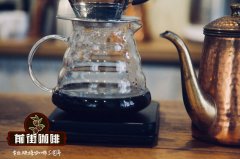What are the varieties of coffee beans? why is Jamaica's Blue Mountain coffee expensive?

Professional coffee knowledge exchange more coffee bean information please follow the coffee workshop (Wechat official account cafe_style)
A brief introduction to the prices of three varieties of Qianjie Coffee and Jamaica Blue Mountain Coffee
There are three major varieties of coffee: the three native species are Arabica, Robusta and Liberika (Liberika). Arabica ranks first in terms of production, accounting for about 6070% of the world's coffee production. There are bourbon, Tibica and other sub-varieties. Robusta accounts for about 3040% of the world's total coffee production. Liberian cards account for only 3% of the total and are mostly grown in the Asia-Pacific region.
Liberia, also known as large-grain coffee beans, has strong vitality, but at the same time, its flavor and resistance to leaf rust are weak, and its planting capacity is less than 1%. It has basically withdrawn from the commercial market and is only preserved in scientific research. So today we are going to focus on Arabica.
Arabica coffee's excellent flavor and aroma make it the only coffee that can be drunk directly and alone among these native species, such as the Blue Mountains of Jamaica, Mantenin of Indonesia, Yega Snow Coffee and Brazilian Coffee. Iron pickup is a derivative of Arabica, including the famous Jamaican Blue Mountain Coffee.
Pure Jamaican Blue Mountain Coffee perfectly combines the unique sour, bitter, sweet, mellow and other flavors of coffee to form an elegant atmosphere and moderate characteristics. Their coffee trees are on rugged hillsides, and the picking process is so difficult that non-local skilled female workers are simply unable to do it. It is very important to choose the right ripe coffee beans when picking. Immaturity or ripeness will affect the quality of the coffee. The picked coffee beans are shelled on the same day, and then let them ferment for 18 hours.
After that, the coffee beans were cleaned and screened. The subsequent process is to dry, which must be carried out on the cement floor or on a thick blanket until the humidity of the coffee beans drops to 12% 14%. And then store it in a special warehouse. Take it out and roast when needed, then grind it into powder. These procedures must be strictly mastered, otherwise, the quality of coffee will be affected.
The Blue Mountains of Meijia, which belongs to the tropical rain forest climate, has abundant rainfall and sunshine, which provides favorable conditions for the growth of coffee beans. Secondly, as Japan has always invested in the Jamaican coffee industry, Blue Mountain Coffee is mostly owned by the Japanese, and they have also obtained the right of priority to buy Blue Mountain Coffee. In 1992, Jamaica sold 688 tons of Blue Mountain coffee to Japan, 75 tons to the United States and 59 tons to Britain. 90% of Blue Mountain coffee is bought by the Japanese. Since the rest of the world can only get 10% of Blue Mountain, regardless of the price, Blue Mountain coffee is always in short supply.
[Jamaica Blue Mountains]
Origin: Jamaica
Manor: silver Hill Manor
Flavor: very subtle combination of sour, sweet, bitter, fresh, fragrant, mellow, aromatic, smooth, mellow, even sweet taste, harmonious taste, excellent flavor.
END
Important Notice :
前街咖啡 FrontStreet Coffee has moved to new addredd:
FrontStreet Coffee Address: 315,Donghua East Road,GuangZhou
Tel:020 38364473
- Prev

Taste the acidity of coffee what affects the acidity of coffee
Professional coffee knowledge exchange more coffee bean information please follow the coffee workshop (Wechat official account cafe_style) when you hear the word acidity, you may think of sour, tangy, bitter, sharp. But the word has at least three uses in the coffee world: 1. Coffee lovers and enthusiasts believe that acidity is a dry, bright, shiny feeling that makes it high.
- Next

What is the relationship between coffee acidity and high coffee bean acidity? effect of coffee bean acidity on the body?
Professional coffee knowledge exchange more coffee bean information please follow the coffee workshop (Wechat official account cafe_style) put beans or dump acid compounds, or dark roast their extreme possibility, Kenneth Davis said coffee comments, as effective production of delicious low acid low to find a natural low acidity of grown coffee, careful selection and processing, bring to a mild roasting development sugar
Related
- Beginners will see the "Coffee pull flower" guide!
- What is the difference between ice blog purified milk and ordinary milk coffee?
- Why is the Philippines the largest producer of crops in Liberia?
- For coffee extraction, should the fine powder be retained?
- How does extracted espresso fill pressed powder? How much strength does it take to press the powder?
- How to make jasmine cold extract coffee? Is the jasmine + latte good?
- Will this little toy really make the coffee taste better? How does Lily Drip affect coffee extraction?
- Will the action of slapping the filter cup also affect coffee extraction?
- What's the difference between powder-to-water ratio and powder-to-liquid ratio?
- What is the Ethiopian local species? What does it have to do with Heirloom native species?

